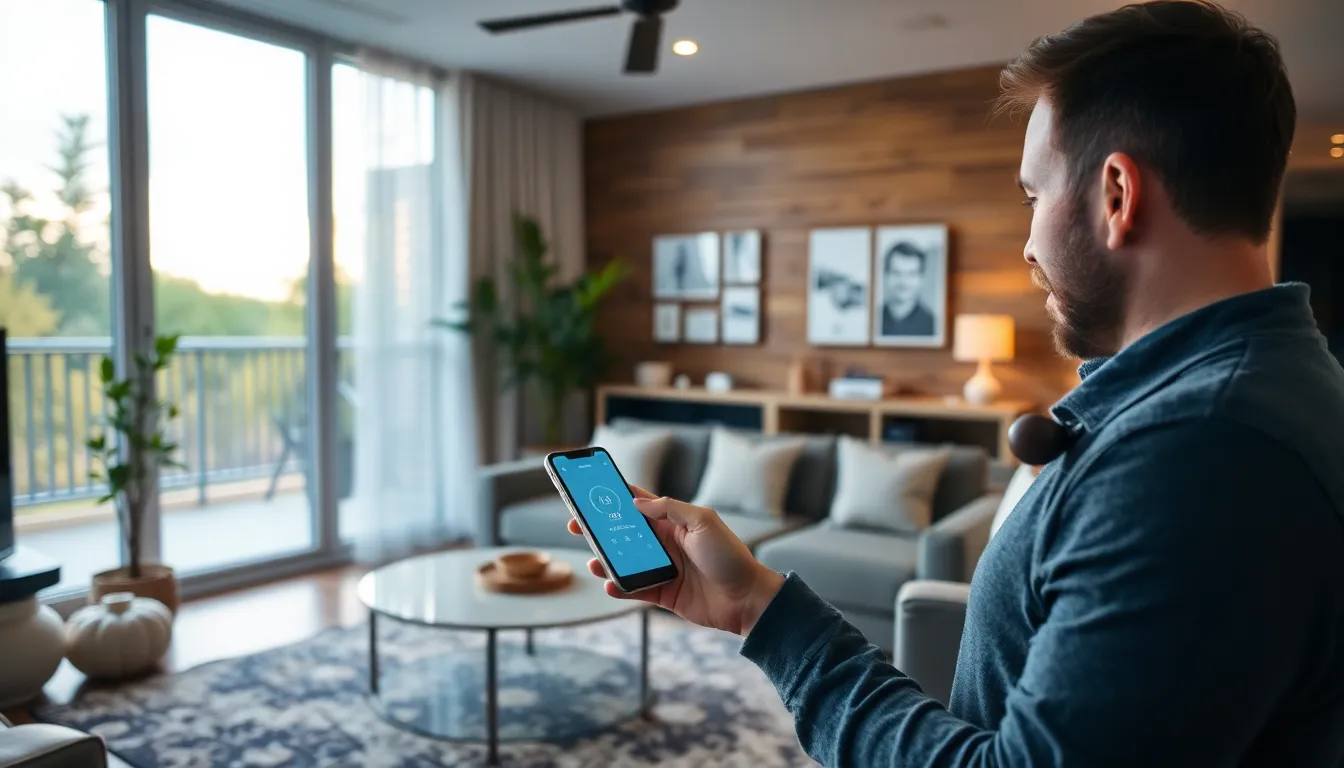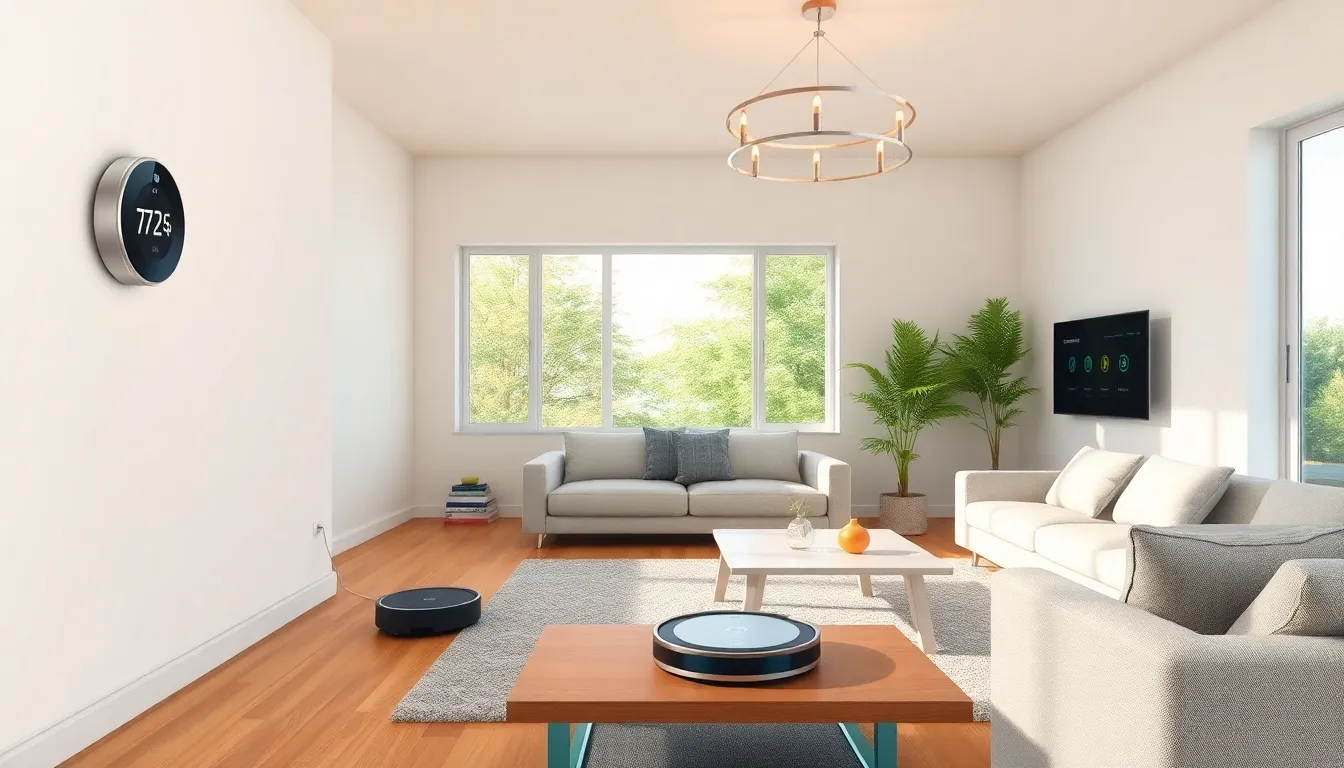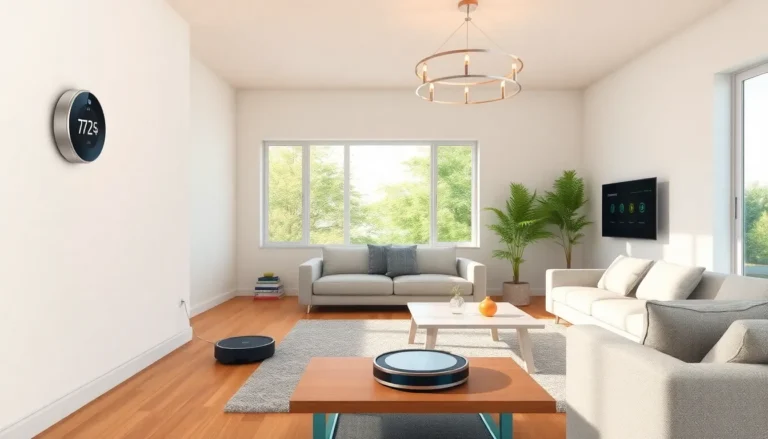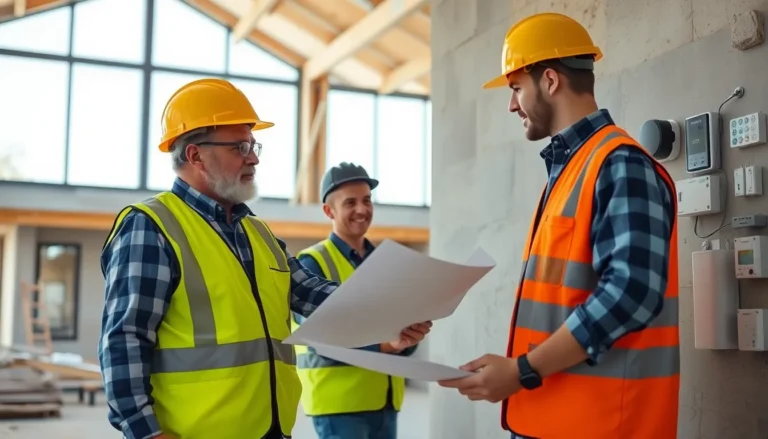Table of Contents
ToggleImagine waking up to a home that knows you better than your best friend. Smart homes are not just a futuristic dream; they’re the reality that’s making life easier, safer, and a bit more fun. With just a voice command or a tap on your smartphone, you can control everything from your lights to your thermostat, making your home as responsive as a well-trained puppy.
But it’s not all about convenience. Smart homes can save money, boost security, and even help reduce your carbon footprint. Who wouldn’t want to live in a place that’s both high-tech and eco-friendly? Dive into the world of smart homes, where comfort meets innovation, and discover the perks that’ll make your neighbors green with envy. After all, who needs a crystal ball when your home can predict your needs?
Overview of Smart Homes
Smart homes utilize advanced technology to create more efficient living environments. These homes integrate devices that connect to the internet, allowing for remote control and monitoring of various systems. Home automation acts as a central hub, coordinating lighting, heating, and security functions seamlessly.
Energy management systems lower utility costs by optimizing energy use in real-time. For instance, smart thermostats adjust temperature settings based on occupancy patterns. Such functionality increases comfort while reducing energy waste, making a noticeable impact on monthly bills.
Security enhancements in smart homes provide peace of mind. Systems like smart locks and cameras allow homeowners to monitor their property from anywhere. Notifications sent to smartphones alert users about unusual activity, empowering them to take immediate actions if needed.
Voice-activated assistants streamline daily routines. Tasks like turning lights on or adjusting appliances become hands-free, enhancing convenience. Also, families can customize their living spaces with personalized settings, catering to individual preferences.
Compatibility with renewable energy sources strengthens the environmental benefits. Smart homes can incorporate solar panels and battery storage systems, utilizing clean energy and further decreasing reliance on traditional utilities.
Many users report significant savings due to additional features like smart irrigation systems that optimize water usage. These intelligent devices ensure plants receive appropriate amounts of water based on weather conditions, promoting sustainability.
Overall, smart homes transform everyday living by combining convenience, security, and energy efficiency, encouraging homeowners to embrace innovative technologies.
Convenience in Daily Life

Smart homes significantly enhance everyday living, making daily routines simpler and more efficient. Automation features streamline tasks, giving homeowners more time for other activities.
Automation of Routine Tasks
Smart devices automate routine tasks, reducing manual efforts. For example, smart lighting adjusts based on occupancy, ensuring rooms are well-lit only when needed. Smart coffee makers allow users to schedule brewing times, providing fresh coffee each morning. Additionally, robotic vacuum cleaners handle floor cleaning autonomously. Such automation not only saves time but also minimizes the effort required for household chores.
Remote Access and Control
Remote access to smart home devices offers unparalleled convenience. Homeowners can check security cameras and adjust thermostats from anywhere using smartphones or tablets. For instance, smart locks enable users to lock or unlock doors remotely, enhancing security and access control. Notifications about home activity keep owners informed in real time. Remote management of appliances leads to energy savings, as users can turn off devices left on inadvertently. This flexibility makes everyday life more manageable and worry-free.
Energy Efficiency and Cost Savings
Smart homes significantly enhance energy efficiency, leading to substantial cost savings for homeowners. Advanced technologies enable better control over energy consumption.
Smart Thermostats and Lighting
Smart thermostats adjust heating and cooling settings based on occupancy patterns. These devices often reduce energy use by 10 to 15 percent, according to ENERGY STAR. Automated lighting systems also support energy savings by turning off lights in unoccupied rooms. Scheduling lights to dim or brighten at specific times further enhances this efficiency. Many smart lighting solutions allow dimming, which uses less electricity and extends bulb life.
Monitoring Energy Usage
Monitoring energy usage becomes straightforward with smart home technology. Real-time data tracking helps homeowners identify energy peaks and reduce waste. Some systems offer detailed reports that display energy consumption patterns. This visibility allows for informed decisions on energy use, fostering habits that lead to savings. Many devices can send alerts about excessive energy consumption, enabling prompt adjustments.
Enhanced Security Features
Smart homes provide advanced security features that enhance the safety of living spaces. Integration of smart technology allows homeowners to monitor their property effectively.
Smart Locks and Cameras
Smart locks enhance security by offering keyless entry and remote access features. Homeowners can lock and unlock doors through smartphone apps, eliminating the need for physical keys. Cameras provide real-time video feeds, allowing homeowners to check their property at any time. Geofencing technology can trigger notifications when residents leave or arrive home, ensuring safe entry. High-definition video quality and motion detection capabilities alert homeowners about suspicious activity, enhancing vigilance. Unauthorized access attempts prompt immediate notifications, allowing for swift action. Many smart camera systems support cloud storage, ensuring footage is retrievable and secure.
Alarm Systems and Alerts
Alarm systems in smart homes provide comprehensive protection against potential threats. Equipped with motion sensors, these systems detect unusual activity and trigger alarms promptly. Instant alerts send notifications to homeowners’ smartphones, ensuring they remain informed about their property’s safety. Integration with emergency services facilitates rapid response in critical situations. Some systems broadcast alerts to neighbors, enhancing communal security. Monitoring services often offer 24/7 surveillance, providing peace of mind even when homeowners are away. Regular updates about system status keep homeowners informed, fostering a proactive approach to security management.
Increased Home Value
Smart home technology significantly boosts property value. Homes equipped with smart devices often attract higher offers compared to traditional homes. A 2023 study revealed that smart home features can increase market value by 3 to 5 percent. Potential buyers appreciate energy-efficient systems, enhanced security, and modern conveniences that smart homes provide.
Upgrading to smart technology proves to be a wise investment. Integration of smart thermostats, energy-efficient lighting, and automated security systems appeals to environmentally conscious buyers. Homes with these features generally sell faster and draw interest in competitive markets.
Local real estate agents report growing demand for smart homes, particularly among younger buyers. Many buyers view smart home technology as vital, expecting these amenities as standard. Such preferences drive up property values and make homes equipped with these systems more desirable.
Numerous studies show the appeal of automated systems extends beyond energy savings. Smart homes streamline daily living and improve security, factors that resonate with buyers. Increased comfort and convenience contribute to the overall attractiveness of properties equipped with smart technologies.
Homeowners seeking to sell can leverage these features effectively. Highlighting smart home capabilities during listings and showings showcases modern living benefits. Utilize specific device details, like smart locks and energy-efficient appliances, to capture buyer interest and elevate market position.
Smart homes represent a transformative approach to modern living. By integrating technology into everyday tasks, they provide unparalleled convenience and security while promoting energy efficiency. Homeowners can enjoy significant savings and enhanced safety through smart devices that adapt to their lifestyles.
As these technologies continue to evolve, the appeal of smart homes will only grow. They not only simplify daily routines but also increase property value, making them a wise investment for the future. Embracing smart home innovations is a step towards a more efficient and enjoyable living environment.





